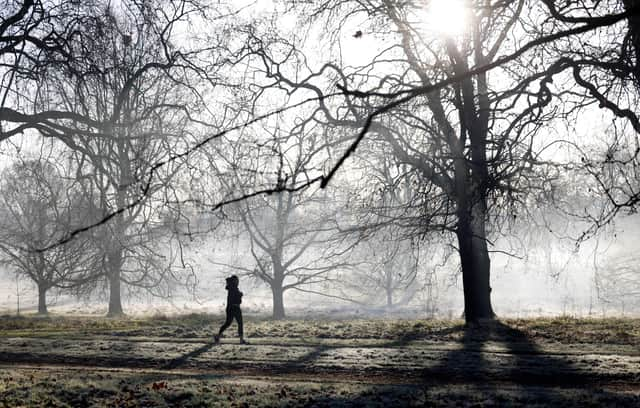Cold Therapy: one expert shares why exercising in the winter weather may be more beneficial to your health


One expert has revealed why the cold wet weather may be the best time to exercise as he looks into harnessing the power of the cold.
British television producer and journalist Dr Micheal Mosley explored the idea that exercising in winter can be better for you as he spoke to researchers and experts on the benefits of Cold Therapy.
Advertisement
Hide AdAdvertisement
Hide AdOn a new BBC Radio 4 podcast called Cold Therapy, the wellbeing expert has been looking at how to "invite the cold into your life". In the third episode, Dr Mosley looked at exercising in the cold. after saying it had "real advantages". He said: "Not surprisingly, we tend to be much less active in the winter months than during the summer when it's warm and dry. But there are some real advantages to exercising when it's colder, not least that you'll probably find it easier. Believe it or not, you can work harder, faster, and get fit quicker if it's a little cooler outside."
One of his guests from the University of Roehampton, Dr Chris Tyler, had been researching why our bodies react differently when it's colder, and worked with cyclists, runners, the military, firefighters and Formula One drivers to see how they could improve their health and performance in hot and cold environments.
He found that running in the cold made for better performance and that the optimal temperature for recreational runners was around 10C or 11C.
For elite marathon runners, the optimal temperature was between 4C and 8C. In a 2022 study, data from more than 1,000 running events found the best temperatures for performance to be between 7.5C and 15C.
Advertisement
Hide AdAdvertisement
Hide AdThe reason why people perform better in lower temperatures is simple- they don't get as hit which means their body is under less stress. There was less need to lose the heat, meaning less blood was sent to the skin, so the heart doesn't have to work as hard, allowing you to exercise more. Sweating also means a risk of dehydration.
Dr Mosley said: "What's clear is that exercising on a winter's day could be surprisingly beneficial." He then went for a run in the cold to examine the effect."
His second guest, Hannah Pallubinsky, assistant professor at Maastricht University said the body reacts to cold stimulus, as the muscles produce heat and increase body temperature. Dr Tyler said: "That means that you can exercise harder, if you want, for the same level of strain as you'd experience in other conditions and that might mean that you run faster or get more fitness benefits as a result, or it might mean that you just exercise at the same intensity under a lower strain and have less potential consequences of doing so."
However, Dr Mosley said any benefits stopped at around 11C, as cold and dry air can aggravate some people's lungs, especially if they have asthma, for example. He also warned that people with heart conditions should consult their GP first.
Advertisement
Hide AdAdvertisement
Hide AdDr Mosley: "Going for a run or brisk walk at any time of year is going to be good for your heart and brain, but, as I've discovered, you should find, on the whole, exercising in the winter is easier."
He added: "Regular exercise is a great way to boost your immune system and during these colder months in particular, that can only be a good thing."
Comment Guidelines
National World encourages reader discussion on our stories. User feedback, insights and back-and-forth exchanges add a rich layer of context to reporting. Please review our Community Guidelines before commenting.
